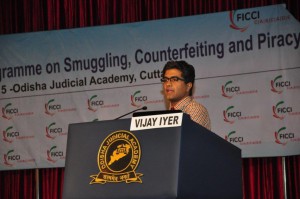22nd May 2015 Mumbai, India
IP – savvy future judges
 Imagine speaking to an audience of state level judges-in-training on intellectual property (IP)! Well, I had the honour of doing so at the Odisha Judicial Academy in Cuttack, Odisha on 11 April 2015. At the academy, newly recruited state judicial officers learn about, inter alia, the different areas of law, judicial attitude, aptitude orientation and ethical conduct. The Federation of Indian Chambers of Commerce and Industry (FICCI) had organised a judiciary sensitisation programme on smuggling, counterfeiting and piracy to make the judges-in-training aware of the rampant violations of IP rights in India and the subsequent losses to the government and society.
Imagine speaking to an audience of state level judges-in-training on intellectual property (IP)! Well, I had the honour of doing so at the Odisha Judicial Academy in Cuttack, Odisha on 11 April 2015. At the academy, newly recruited state judicial officers learn about, inter alia, the different areas of law, judicial attitude, aptitude orientation and ethical conduct. The Federation of Indian Chambers of Commerce and Industry (FICCI) had organised a judiciary sensitisation programme on smuggling, counterfeiting and piracy to make the judges-in-training aware of the rampant violations of IP rights in India and the subsequent losses to the government and society.
The programme included speakers from government, academia, and industry. Not surprisingly, the emphasis in each talk was on the debilitating consequences of counterfeiting on the well being of the society as well as economy. In a recent report published by FICCI and titled, Illicit markets – a threat to our national interests, it is estimated that the losses from the illegal trading of goods had increased by 44.4% in 2013-14 compared to that in 2011-12. The report covered key industry sectors such as packaged and personal goods, auto, mobile phones, and tobacco.
In my talk, I shared the UK’s best practices in IP enforcement. The UK model is based on the effective coordination of the various government agencies including UK Intellectual Property Office (IPO), Police, and HM Revenue & Customs. I briefly touched upon the Police Intellectual Property Crime Unit (PIPCU). This unit was established in September 2013, with support from the UK IPO, to counter the menaces of counterfeiting and piracy. One of the unit’s initiatives is to shut down websites offering unauthorised access to copyrighted material. Such rogue websites are catalogued in the form of an Infringing Website List. Advertisers and other such agencies can refer to the list before taking the decision to place ads and other marketing content on any website.
Litigation, in general, costs time and money. If you’re a small company, then a law suit could potentially drain out all your resources. Keeping the interests of small and medium enterprises, and individual innovators, the UK has set up an Intellectual Property Enterprise Court (IPEC) to make IP litigation both time-saving and cost effective. The court has two tracks: i) multi track for damages of up to £500,000; and ii) small claims track for claims of up to £10,000. It is noteworthy that India’s draft IP rights policy proposes to establish specialised patent benches at High Courts as well as district level IP courts for speedier adjudication of IP infringement cases.
The programme concluded with an invigorating Q&A session with the trainee judges who were really keen to learn more about intellectual property disputes. If there’s a next time, I would love to bring along an IPEC judge to share interesting UK cases and key judgements thereof.